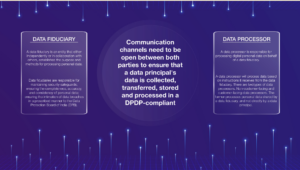The rapid digitization of economies has led to the exponential growth of personal data being generated, collected, and processed. In light of the increasing risks posed by data misuse and breaches, governments worldwide are enacting stringent laws to protect individuals’ privacy. India, too, has recognized the need for robust data protection regulations, and the Digital Personal Data Protection (DPDP) Act, 2023, is the country’s answer to these concerns. The DPDP Act aims to provide a framework that ensures the protection of an individual’s personal data and safeguards their digital privacy rights. In this blog, we delve into the specifics of the DPDP Act, outlining its core principles, key provisions, the rights and obligations it establishes, and answering common questions about its implementation and impact.
What is the DPDP Act?
The Digital Personal Data Protection (DPDP) Act, introduced in 2023, is India’s first major legislative step toward creating a robust legal structure for personal data protection. The law seeks to establish trust between Data Fiduciaries (organizations, corporations, or any entity handling personal data) and individuals, referred to as data principals in the Act. It mandates that the processing of personal data upholds privacy, security, and transparency, while also honoring an individual’s fundamental rights.
The DPDP Act applies to both data fiduciaries (the entities deciding the purpose and means of data processing) and data processors (third parties that process data on behalf of a data fiduciary). Whether the data processing occurs within India or abroad, the DPDP Act asserts jurisdiction over any entity dealing with the personal data of Indian citizens.
Key Objectives and Principles of the DPDP Act

The DPDP Act revolves around several key principles that serve as the foundation for its structure. These principles ensure fairness, transparency, and accountability in the handling of personal data.
- Consent-Based Processing: At the core of the DPDP Act is the principle that individuals must provide informed consent before their data can be collected and processed. Consent must be specific, informed, and freely given. Organizations are required to explain in clear terms why the data is being collected, how it will be used, and for how long it will be retained.
- Purpose Limitation: Data fiduciaries are allowed to collect and process data only for the purposes explicitly disclosed to the data principal. Any processing beyond the stated purpose requires fresh and additional consent.
- Data Minimization: Only the data necessary for fulfilling the specified purpose should be collected. This principle discourages the collection of excessive or unnecessary information, thus limiting potential misuse.
- Data Accuracy and Completeness: Organizations must ensure that the personal data they collect is accurate, up-to-date, and complete. This helps prevent incorrect or outdated information from causing harm to the data principal.
- Retention Limitation: Personal data must be retained only for as long as necessary to fulfill the purpose for which it was collected. Once that purpose has been achieved, the data must either be deleted or anonymized.
- Security and Safeguards: Data fiduciaries must implement robust security measures to protect personal data from unauthorized access, data breaches, and cyber threats. These measures include encryption, regular security audits, and access control mechanisms.
- Accountability and Transparency: The DPDP Act mandates that data fiduciaries remain accountable for their data processing activities and be transparent with individuals about how their data is being used, stored, and protected. Organizations are also required to maintain clear records of their data processing practices to demonstrate compliance.
Rights of Data Principals
The DPDP Act grants individuals several important rights over their personal data. These rights empower individuals to control how their data is used and processed, ensuring their digital privacy.
-
- Right to Correction and Erasure: If the personal data is inaccurate, incomplete, or outdated, Data Principals can request that it be corrected. Additionally, they can request that their data be deleted if it is no longer needed for the original processing purpose or if the consent has been withdrawn.
- Right to Grievance Redressal: The DPDP Act establishes mechanisms through which data principals can file complaints against data fiduciaries that violate their rights or breach the law. A Data Protection Board will be created to handle complaints and ensure that organizations comply with the law.
- Right to Nominate: The DPDP Act grants data principals the right to designate someone to exercise their data rights on their behalf if they become deceased or incapacitated.

The DPDP Act imposes several responsibilities on data fiduciaries to ensure they handle personal data with care and transparency. These obligations are designed to protect individuals’ privacy and ensure compliance with data protection standards.
- Obtain Explicit Consent: Data fiduciaries must obtain explicit consent from data principals before collecting or processing their personal data. This consent must be clear and specific, and data fiduciaries must be transparent about the purpose of data collection and how it will be processed.
- Ensure Security Measures: Data fiduciaries must implement technical and organizational measures to secure personal data from breaches, hacks, or other cyber threats. This includes adopting encryption, secure storage solutions, and conducting regular security assessments to identify potential vulnerabilities.
- Data Breach Notification: In the event of a data breach, data fiduciaries are required to notify both the affected data principals and the Data Protection Board within a reasonable time frame. This helps minimize the damage caused by the breach and ensures that remedial action is taken promptly.
- Appoint a Data Protection Officer (DPO): Large organizations or those processing large volumes of sensitive personal data are required to appoint a DPO. They are responsible for overseeing the organization’s compliance with the DPDP Act, conducting audits, and serving as the point of contact for the Data Protection Board.
- Conduct Data Protection Impact Assessments (DPIAs): DPIAs must be conducted when processing activities pose a high risk to the privacy of individuals. These assessments help data fiduciaries understand the potential risks associated with their data processing operations and implement measures to mitigate them.
- Ensure Accountability and Transparency: Data fiduciaries must maintain detailed records of all data processing activities and be able to demonstrate compliance with the DPDP Act. This includes maintaining transparency with data principals about how their data is being processed and ensuring that they are informed about their rights.
Cross-Border Data Transfers
With the increasing globalization of businesses, data often needs to be transferred across borders. The DPDP Act outlines specific rules for the transfer of personal data outside India, ensuring that the data remains protected even when it leaves the country.
- Adequacy Decisions: The Indian government may specify certain countries or territories as “adequate” destinations for cross-border data transfers, meaning these regions provide a level of data protection comparable to India’s standards.
- Standard Contractual Clauses (SCCs): Data fiduciaries can transfer data to countries not listed as adequate by implementing Standard Contractual Clauses (SCCs), which are legally binding contracts that impose data protection obligations on the recipient of the data.
- Government Restrictions: The Indian government reserves the right to restrict data transfers to certain countries if it deems such transfers to be a risk to national security or public interest.
Penalties and Non-Compliance
The DPDP Act imposes strict penalties for non-compliance to ensure that organizations take data protection seriously. These penalties are designed to be proportional to the severity of the violation, with serious breaches resulting in hefty fines.
- Financial Penalties: Fines for non-compliance can go up to ₹250 crore per violation, depending on the nature and impact of the violation. For example, failure to implement adequate security measures or failing to notify the Data Protection Board of a breach may attract steep penalties.
- Compensation to Data Principals: Data fiduciaries may need to compensate data principals for damages from data breaches or DPDP Act violations.
- Criminal Offenses: Certain breaches of the DPDP Act may be considered criminal offenses. Parties responsible for such offenses could face imprisonment or additional sanctions.
The Role of the Data Protection Board
To ensure compliance with the DPDP Act, the law establishes the foundation of a Data Protection Board. This independent authority is tasked with investigating complaints from data principals, monitoring data fiduciary activities, and ensuring that organizations adhere to the provisions of the Act.
This Board also has the authority to impose penalties for non-compliance and oversee cross-border data transfers. It acts as the central regulatory body to uphold the principles and objectives of the DPDP Act.
FAQs About the DPDP Act
- What constitutes personal data under the DPDP Act?
Personal data is any information that is directly or indirectly related to or used to identify an individual. This includes but is not limited to, names, contact information, government-issued identifiers (such as Aadhaar or PAN), and location data.
- How does the DPDP Act ensure the security of personal data?
Data fiduciaries must implement appropriate security measures such as encryption, access control, and regular security audits. In case of a data breach, organizations should notify affected data principals and the Data Protection Board on time.
- Can an individual withdraw their consent under the DPDP Act?
Yes, individuals (data principals) have the right to withdraw their consent at any time. In such a case, the data fiduciary should immediately stop processing their data. However, an exception to this could be a legal basis for processing.
- What happens if a company violates the DPDP Act?
A company can face severe financial penalties of up to ₹250 crore if it has violated the DPDP Act. Additionally, the company may be required to compensate individuals for any harm caused by the violation.
- Does the DPDP Act apply to companies outside India?
Yes, the DPDP Act applies to foreign entities if they process the personal data of Indian citizens. This ensures that even global companies offering services in India are bound by the provisions of the Act.
The Digital Personal Data Protection (DPDP) Act represents a significant milestone in India’s journey toward protecting the privacy of its citizens in the digital age. By establishing a comprehensive framework for personal data protection, the DPDP Act sets up a robust framework for personal data protection, giving individuals control over their data and holding organizations accountable. Businesses must adapt by enforcing strong data protection measures and maintaining transparency to ensure compliance and build trust.
 IND
IND ID
ID PH
PH
